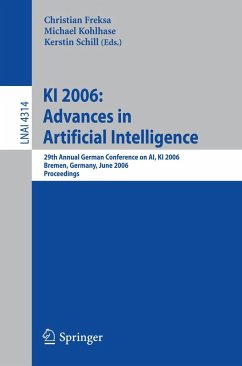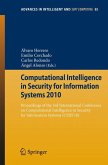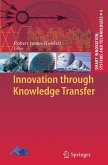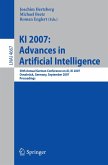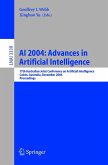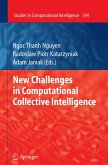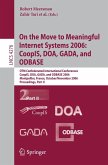KI 2006 (eBook, PDF)
29th Annual German Conference on AI, KI 2006, Bremen, Germany, June 14-17, 2006, Proceedings
Redaktion: Freksa, Christian; Schill, Kerstin; Kohlhase, Michael
40,95 €
40,95 €
inkl. MwSt.
Sofort per Download lieferbar

20 °P sammeln
40,95 €
Als Download kaufen

40,95 €
inkl. MwSt.
Sofort per Download lieferbar

20 °P sammeln
Jetzt verschenken
Alle Infos zum eBook verschenken
40,95 €
inkl. MwSt.
Sofort per Download lieferbar
Alle Infos zum eBook verschenken

20 °P sammeln
KI 2006 (eBook, PDF)
29th Annual German Conference on AI, KI 2006, Bremen, Germany, June 14-17, 2006, Proceedings
Redaktion: Freksa, Christian; Schill, Kerstin; Kohlhase, Michael
- Format: PDF
- Merkliste
- Auf die Merkliste
- Bewerten Bewerten
- Teilen
- Produkt teilen
- Produkterinnerung
- Produkterinnerung

Bitte loggen Sie sich zunächst in Ihr Kundenkonto ein oder registrieren Sie sich bei
bücher.de, um das eBook-Abo tolino select nutzen zu können.
Hier können Sie sich einloggen
Hier können Sie sich einloggen
Sie sind bereits eingeloggt. Klicken Sie auf 2. tolino select Abo, um fortzufahren.

Bitte loggen Sie sich zunächst in Ihr Kundenkonto ein oder registrieren Sie sich bei bücher.de, um das eBook-Abo tolino select nutzen zu können.
This book constitutes the thoroughly refereed post-proceedings of the 29th Annual German Conference on Artificial Intelligence, KI 2006, held in Bremen, Germany, in June 2006. This was co-located with RoboCup 2006, the innovative robot soccer world championship, and with ACTUATOR 2006, the 10th International Conference on New Actuators. The 29 revised full papers presented together with two invited contributions were carefully reviewed and selected from 112 submissions.
- Geräte: PC
- ohne Kopierschutz
- eBook Hilfe
- Größe: 16.95MB
Andere Kunden interessierten sich auch für
![Computational Intelligence in Security for Information Systems 2010 (eBook, PDF) Computational Intelligence in Security for Information Systems 2010 (eBook, PDF)]() Computational Intelligence in Security for Information Systems 2010 (eBook, PDF)113,95 €
Computational Intelligence in Security for Information Systems 2010 (eBook, PDF)113,95 €![Innovation through Knowledge Transfer (eBook, PDF) Innovation through Knowledge Transfer (eBook, PDF)]() Innovation through Knowledge Transfer (eBook, PDF)161,95 €
Innovation through Knowledge Transfer (eBook, PDF)161,95 €![Ontology, Epistemology, and Teleology for Modeling and Simulation (eBook, PDF) Ontology, Epistemology, and Teleology for Modeling and Simulation (eBook, PDF)]() Ontology, Epistemology, and Teleology for Modeling and Simulation (eBook, PDF)113,95 €
Ontology, Epistemology, and Teleology for Modeling and Simulation (eBook, PDF)113,95 €![KI 2007: Advances in Artificial Intelligence (eBook, PDF) KI 2007: Advances in Artificial Intelligence (eBook, PDF)]() KI 2007: Advances in Artificial Intelligence (eBook, PDF)40,95 €
KI 2007: Advances in Artificial Intelligence (eBook, PDF)40,95 €- -12%11
![AI 2004: Advances in Artificial Intelligence (eBook, PDF) AI 2004: Advances in Artificial Intelligence (eBook, PDF)]() AI 2004: Advances in Artificial Intelligence (eBook, PDF)113,95 €
AI 2004: Advances in Artificial Intelligence (eBook, PDF)113,95 € ![New Challenges in Computational Collective Intelligence (eBook, PDF) New Challenges in Computational Collective Intelligence (eBook, PDF)]() New Challenges in Computational Collective Intelligence (eBook, PDF)113,95 €
New Challenges in Computational Collective Intelligence (eBook, PDF)113,95 €![On the Move to Meaningful Internet Systems 2006: CoopIS, DOA, GADA, and ODBASE (eBook, PDF) On the Move to Meaningful Internet Systems 2006: CoopIS, DOA, GADA, and ODBASE (eBook, PDF)]() On the Move to Meaningful Internet Systems 2006: CoopIS, DOA, GADA, and ODBASE (eBook, PDF)73,95 €
On the Move to Meaningful Internet Systems 2006: CoopIS, DOA, GADA, and ODBASE (eBook, PDF)73,95 €-
-
-
This book constitutes the thoroughly refereed post-proceedings of the 29th Annual German Conference on Artificial Intelligence, KI 2006, held in Bremen, Germany, in June 2006. This was co-located with RoboCup 2006, the innovative robot soccer world championship, and with ACTUATOR 2006, the 10th International Conference on New Actuators. The 29 revised full papers presented together with two invited contributions were carefully reviewed and selected from 112 submissions.
Dieser Download kann aus rechtlichen Gründen nur mit Rechnungsadresse in A, B, BG, CY, CZ, D, DK, EW, E, FIN, F, GR, HR, H, IRL, I, LT, L, LR, M, NL, PL, P, R, S, SLO, SK ausgeliefert werden.
Produktdetails
- Produktdetails
- Verlag: Springer Berlin Heidelberg
- Seitenzahl: 464
- Erscheinungstermin: 21. August 2007
- Englisch
- ISBN-13: 9783540699125
- Artikelnr.: 44132202
- Verlag: Springer Berlin Heidelberg
- Seitenzahl: 464
- Erscheinungstermin: 21. August 2007
- Englisch
- ISBN-13: 9783540699125
- Artikelnr.: 44132202
- Herstellerkennzeichnung Die Herstellerinformationen sind derzeit nicht verfügbar.
Session 1. Invited Talk.- Expressivity-Preserving Tempo Transformation for Music - A Case-Based Approach.- Session 2. Cognition and Emotion.- MicroPsi: Contributions to a Broad Architecture of Cognition.- Affective Cognitive Modeling for Autonomous Agents Based on Scherer's Emotion Theory.- Session 3A. Semantic Web.- OWL and Qualitative Reasoning Models.- Techniques for Fast Query Relaxation in Content-Based Recommender Systems.- Session 3B. Analogy.- Solving Proportional Analogies by E-Generalization.- Building Robots with Analogy-Based Anticipation.- Session 4A. Natural Language.- Classification of Skewed and Homogenous Document Corpora with Class-Based and Corpus-Based Keywords.- Learning an Ensemble of Semantic Parsers for Building Dialog-Based Natural Language Interfaces.- Session 4B. Reasoning.- Game-Theoretic Agent Programming in Golog Under Partial Observability.- Finding Models for Blocked 3-SAT Problems in Linear Time by Systematical Refinement of a Sub-model.- Towards the Computation of Stable Probabilistic Model Semantics.- DiaWOz-II - A Tool for Wizard-of-Oz Experiments in Mathematics.- Session 5. Invited Talk.- Applications of Automated Reasoning.- Session 6A. Ontologies.- On the Scalability of Description Logic Instance Retrieval.- Relation Instantiation for Ontology Population Using the Web.- Session 6B. Spatio-temporal Reasoning.- GeTS - A Specification Language for Geo-Temporal Notions.- Active Monte Carlo Recognition.- Session 7A. Machine Learning.- Cross System Personalization and Collaborative Filtering by Learning Manifold Alignments.- A Partitioning Method for Mixed Feature-Type Symbolic Data Using a Squared Euclidean Distance.- Session 7B. Spatial Reasoning.- On Generalizing Orientation Information in .- Towards the Visualisation ofShape Features The Scope Histogram.- Session 8A. Robot Learning.- A Robot Learns to Know People-First Contacts of a Robot.- Recombinant Rule Selection in Evolutionary Algorithm for Fuzzy Path Planner of Robot Soccer.- Session 8B. Classical AI Problems.- A Framework for Quasi-exact Optimization Using Relaxed Best-First Search.- Gray Box Robustness Testing of Rule Systems.- A Unifying Framework for Hybrid Planning and Scheduling.- Session 9. Agents.- A Hybrid Time Management Approach to Agent-Based Simulation.- Adaptive Multi-agent Programming in GTGolog.- Agent Logics as Program Logics: Grounding KARO.- On the Relationship Between Playing Rationally and Knowing How to Play: A Logical Account.- Special Event. 50 Years Artificial Intelligence.- 1956-1966 How Did It All Begin? - Issues Then and Now.- Fundamental Questions.- Towards the AI Summer.- History of AI in Germany and The Third Industrial Revolution.- Three Decades of Human Language Technology in Germany.- 1996-2006 Autonomous Robots.- Projects and Vision in Robotics.- What Will Happen in Algorithm Country?.
Session 1. Invited Talk.- Expressivity-Preserving Tempo Transformation for Music - A Case-Based Approach.- Session 2. Cognition and Emotion.- MicroPsi: Contributions to a Broad Architecture of Cognition.- Affective Cognitive Modeling for Autonomous Agents Based on Scherer's Emotion Theory.- Session 3A. Semantic Web.- OWL and Qualitative Reasoning Models.- Techniques for Fast Query Relaxation in Content-Based Recommender Systems.- Session 3B. Analogy.- Solving Proportional Analogies by E-Generalization.- Building Robots with Analogy-Based Anticipation.- Session 4A. Natural Language.- Classification of Skewed and Homogenous Document Corpora with Class-Based and Corpus-Based Keywords.- Learning an Ensemble of Semantic Parsers for Building Dialog-Based Natural Language Interfaces.- Session 4B. Reasoning.- Game-Theoretic Agent Programming in Golog Under Partial Observability.- Finding Models for Blocked 3-SAT Problems in Linear Time by Systematical Refinement of a Sub-model.- Towards the Computation of Stable Probabilistic Model Semantics.- DiaWOz-II - A Tool for Wizard-of-Oz Experiments in Mathematics.- Session 5. Invited Talk.- Applications of Automated Reasoning.- Session 6A. Ontologies.- On the Scalability of Description Logic Instance Retrieval.- Relation Instantiation for Ontology Population Using the Web.- Session 6B. Spatio-temporal Reasoning.- GeTS - A Specification Language for Geo-Temporal Notions.- Active Monte Carlo Recognition.- Session 7A. Machine Learning.- Cross System Personalization and Collaborative Filtering by Learning Manifold Alignments.- A Partitioning Method for Mixed Feature-Type Symbolic Data Using a Squared Euclidean Distance.- Session 7B. Spatial Reasoning.- On Generalizing Orientation Information in .- Towards the Visualisation ofShape Features The Scope Histogram.- Session 8A. Robot Learning.- A Robot Learns to Know People-First Contacts of a Robot.- Recombinant Rule Selection in Evolutionary Algorithm for Fuzzy Path Planner of Robot Soccer.- Session 8B. Classical AI Problems.- A Framework for Quasi-exact Optimization Using Relaxed Best-First Search.- Gray Box Robustness Testing of Rule Systems.- A Unifying Framework for Hybrid Planning and Scheduling.- Session 9. Agents.- A Hybrid Time Management Approach to Agent-Based Simulation.- Adaptive Multi-agent Programming in GTGolog.- Agent Logics as Program Logics: Grounding KARO.- On the Relationship Between Playing Rationally and Knowing How to Play: A Logical Account.- Special Event. 50 Years Artificial Intelligence.- 1956-1966 How Did It All Begin? - Issues Then and Now.- Fundamental Questions.- Towards the AI Summer.- History of AI in Germany and The Third Industrial Revolution.- Three Decades of Human Language Technology in Germany.- 1996-2006 Autonomous Robots.- Projects and Vision in Robotics.- What Will Happen in Algorithm Country?.
